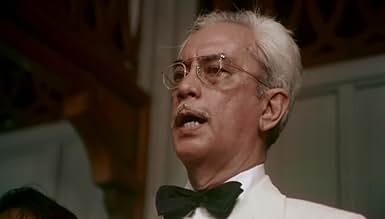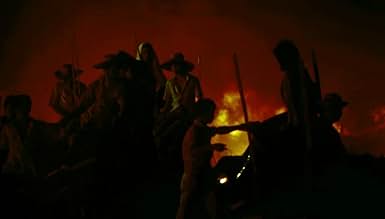Agrega una trama en tu idiomaTwo affluent families struggle and learn to survive during the Japanese occupation in the Philippines.Two affluent families struggle and learn to survive during the Japanese occupation in the Philippines.Two affluent families struggle and learn to survive during the Japanese occupation in the Philippines.
- Dirección
- Guionistas
- Elenco
- Premios
- 8 premios ganados y 8 nominaciones en total
Fides Cuyugan-Asensio
- Inday Lorenzo
- (as Fides Cuyugan-Asencio)
Mitch Valdez
- Jo Russell
- (as Maya Valdez)
Benjamin Delina
- Ponso
- (as Ben Deliña)
Opiniones destacadas
Without any offence to Filipino cinema, this movie was horrible. I was misled by the number of people calling it a masterpiece and my love for foreign and historical films, and couldn't expect what was coming. I suffered so much watching it that in the end I sympathised with that girl begging to be shot in the head. The reasons of my suffering in brief:
1. Sound design is extremely bad, struggling to listen to the characters' voices, the SFX were childish.
2. Unnecessarily long (3 hours that felt like 5). Impressed to learn that was initialy 5h long...
3. Nonsensical and unrealistic violence, made you feel like you are watching a low budget splatter.
4. That joke of a Rambo-like fighting scene near the end of the film that was so amateurishly executed and so long, that felt as if it was a practical joke on the viewer
5. Random sex happening
6. With the exception of a couple of good scenes (like the hacienda fire), the cinematography/photography was very dull
7. Characters (even ghosts) appearing and disappearing without meaning or connection to the plot
8. Excuse my OCD, but even the title Oro, plata, mata (3 part) is not in accordance with the film which is somehow in 4 parts (city, hacienda, forest house, slaughterhouse).
9. The relationships between the characters in the plot were very superficial. Despite the good acting from a couple of the ladies, the rest was so thin that it couldn't hold together the plot.
In case you are expecting to watch a historical epic movie (like the ones OPM is often compared to) I would really suggest you skip. Instead of the treasure you are seeking, you will find a carton of spoiled milk.
In case you are expecting to watch a historical epic movie (like the ones OPM is often compared to) I would really suggest you skip. Instead of the treasure you are seeking, you will find a carton of spoiled milk.
I first watched this film in the 1980s when I was still in College and boy I was so impressed it left a lasting impression on me...40 yrs later I rewatched it in Netflix and it still has the same effect on me... this film is timeless and now considered a classic in Philippine cinema..so proud of this film and this immortalizes the director Peque Gallaga- may he rest in peace! Feeling nostalgic seeing the young Cherie Gil as Trining- one of the greatest actresses in Philippine cinema -she recently passed away and Im glad I got to watch her again in this film. Highly recommended to all millenials and younger generation of Filipinos to watch this -its a gem !
This might be an unpolar opinion.
I watched this movie because too many people consider this classic and rave about it. I love classic filipino film. My favorite movies are Tinimbang ka ngunit kulang and Himala.
This movie however...
It was disappointing. I understand that this is supposed to be a portrayal of the rich and affluent's lives in times of war but all it showed was the rich partying in the city for a long period of the beginning (oro) then the rich having a vacation at an hacienda (plata) and the rich camping at the mountains (mata). Of course the peppered that with talks of war which btw seem like so far away from them. Then in an effort to bring the war closer to them, they were once visited by wouded guerillas and showed some unnecessary gruesome scenes like sewing of bloody wounds. Then we see one Japanese soldier on the river killed brutally, why is he there? Where are the pthers? Why is no one finding these people in the mountains when a japanese was there in the river. Then theres the betrayal of melchor, which may one of the few things in the movie that made sense but was immediately ruined by the ambush part where Miguel and Hermes ak rambo went into the bandits camp heroically and kill everyone even though miguel have a heart problem apparently, another poorly executed character development. Why would Trining go with the bandits anyway? Then why would she call everyone animals at tue end? Kinda hypocritical considering she had sex with Hermes when miguel is her BF and went with the bandits for no apparent reason but a poor character development.
Iguess I was expecting the characters to connect more with the war, but they seem so far off...even the last scene where the party is not lively as the first scene, it still didn't quite feel like there was a war that supposed to somehow changed them into animals in the first place...What happened to the hacienda anyway? What happens after the war? Aside from partying and trining hating everyone when shes the most annoying character?
I watched this movie because too many people consider this classic and rave about it. I love classic filipino film. My favorite movies are Tinimbang ka ngunit kulang and Himala.
This movie however...
It was disappointing. I understand that this is supposed to be a portrayal of the rich and affluent's lives in times of war but all it showed was the rich partying in the city for a long period of the beginning (oro) then the rich having a vacation at an hacienda (plata) and the rich camping at the mountains (mata). Of course the peppered that with talks of war which btw seem like so far away from them. Then in an effort to bring the war closer to them, they were once visited by wouded guerillas and showed some unnecessary gruesome scenes like sewing of bloody wounds. Then we see one Japanese soldier on the river killed brutally, why is he there? Where are the pthers? Why is no one finding these people in the mountains when a japanese was there in the river. Then theres the betrayal of melchor, which may one of the few things in the movie that made sense but was immediately ruined by the ambush part where Miguel and Hermes ak rambo went into the bandits camp heroically and kill everyone even though miguel have a heart problem apparently, another poorly executed character development. Why would Trining go with the bandits anyway? Then why would she call everyone animals at tue end? Kinda hypocritical considering she had sex with Hermes when miguel is her BF and went with the bandits for no apparent reason but a poor character development.
Iguess I was expecting the characters to connect more with the war, but they seem so far off...even the last scene where the party is not lively as the first scene, it still didn't quite feel like there was a war that supposed to somehow changed them into animals in the first place...What happened to the hacienda anyway? What happens after the war? Aside from partying and trining hating everyone when shes the most annoying character?
Philippine Epos starting 1941 and ending after the Pacific War 1945, it shows the history of two aristocratic families during the invasion of Japan and and the resulting chaos that it provoked. Viewers will find influences, form Visconti, Coppola, Scorsese and others but uniquely is the depiction of sex and violence that is very natural and realistic therefore could be schocking for art-house fans. Story progress in an spiral form returning to the beginning but with some changes. Exceptional acting. It belongs to the drama Genre, but also sometimes is a war, love, comedy and horror Film- A must see.
10dokvader
Oro Plata Mata is not just a war film. It is a harrowing exploration of how quickly civility crumbles in the face of brutality. Set against the backdrop of the Japanese occupation of the Philippines during World War II, the film follows two wealthy families seeking refuge deep in the jungle, only to find that their gilded escape offer no true refuge from the chaos that is upon them. Instead of focusing on battles, Gallaga masterfully portrays the insidious erosion of the human condition.
The film is visually stunning, with great shots of the Philippine landscape. Gallaga uses symbolism effectively, particularly the recurring motif of the "oro, plata, mata" (gold, silver, death) game played by the families, which foreshadows their inevitable decline. While the narrative sometimes suffer from pacing issues, the performances are strong and compelling. The characters' development is deeply unsettling and shows the moral compass of each.
The movie avoids simplistic portrayals of black and white. Instead, it explores the complexities of collaboration and resistance, highlighting the moral ambiguities that arise in times of war. It's not merely a story about the horrors inflicted by the enemy but also about the internal conflicts and fracturing of relationships within a society under siege.
It is both a powerful and an unforgettable cinematic experience. Gallaga's film is a reminder of the devastating human cost of war, extending beyond weapons and skirmishes. It's a film that makes you think on the fragility of civilization and the fall of the human mind.
The film is visually stunning, with great shots of the Philippine landscape. Gallaga uses symbolism effectively, particularly the recurring motif of the "oro, plata, mata" (gold, silver, death) game played by the families, which foreshadows their inevitable decline. While the narrative sometimes suffer from pacing issues, the performances are strong and compelling. The characters' development is deeply unsettling and shows the moral compass of each.
The movie avoids simplistic portrayals of black and white. Instead, it explores the complexities of collaboration and resistance, highlighting the moral ambiguities that arise in times of war. It's not merely a story about the horrors inflicted by the enemy but also about the internal conflicts and fracturing of relationships within a society under siege.
It is both a powerful and an unforgettable cinematic experience. Gallaga's film is a reminder of the devastating human cost of war, extending beyond weapons and skirmishes. It's a film that makes you think on the fragility of civilization and the fall of the human mind.
¿Sabías que…?
- TriviaThe opening quote was written by Nick Joaquin. Peque Gallaga, the director told Jose Javier Reyes, the film's screenwriter, to create a frame reference for it and he cited a quote from the well-known writer.
- Bandas sonorasMignon: Act II, Polonaise
Written by Ambroise Thomas
Performed by Lily Pons, Soprano, with RCA Victor Symphony Orchestra (as Victor Symphony Orchestra)
RCA Victor
Selecciones populares
Inicia sesión para calificar y agrega a la lista de videos para obtener recomendaciones personalizadas
- How long is Oro, Plata, Mata?Con tecnología de Alexa
Detalles
- Fecha de lanzamiento
- País de origen
- Sitio oficial
- Idiomas
- También se conoce como
- Gold, Silver, Death
- Locaciones de filmación
- Productora
- Ver más créditos de la compañía en IMDbPro
- Tiempo de ejecución3 horas 14 minutos
- Mezcla de sonido
- Relación de aspecto
- 1.33 : 1
Contribuir a esta página
Sugiere una edición o agrega el contenido que falta

Principales brechas de datos
By what name was Oro, Plata, Mata (1982) officially released in Canada in English?
Responda
























